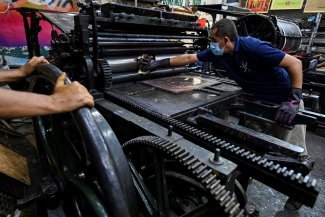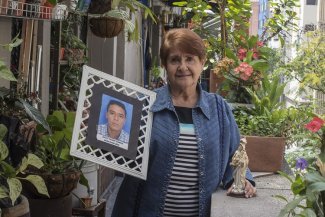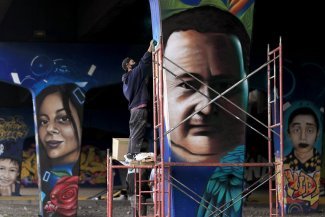On the left, the newly elected president, Gustavo Petro, and, on the right, Francia Márquez, the politician who will serve as vice president.
The wave of progressive governments that swept Latin America at the turn of the century seems to be long gone, not only because of the almost two decades that have passed, but also because of what has been left in its wake, particularly in Venezuela and Nicaragua. But the election of Gustavo Petro Urrego as Colombia’s president may herald a new shift towards progressive policies. The 62-year-old politician, a former member of the M-19 guerrilla movement, a long-serving congressman, senator and former mayor of Bogotá, is the first left-wing president in the country’s history.
The new government, the vice president of which is Francia Márquez – a Black woman and environmental leader from Colombia’s poor Pacific region – is taking the reins against a very different backdrop to that of 20 years ago, as several analysts have pointed out. The aftermath of the pandemic and the resulting economic crisis, growing poverty, inequalities, social discontent and environmental devastation constitute the new battleground of today’s leftists, of which Petro is poised to become a regional leader.
Many fears were raised about what Petro might represent during the presidential race. The spectre of the Venezuelan crisis and his past as a member of an armed group – demobilised in 1990 and a signatory of the 1991 Political Constitution – raised serious concerns among the establishment, which considered any other candidate from the centre or the right to be a safer bet.
Petro responded to these fears by signing pledges to respect private property and economic freedoms. He also made sure that one of the first and most awaited of his appointments was his finance minister. His choice for this role was José Antonio Ocampo, former executive director of the Economic Commission for Latin America and the Caribbean (ECLAC) and a former UN assistant secretary for economic and social affairs. Ocampo’s name reassured almost everyone in the country’s political and economic circles.
Added to the fears surrounding Petro are a context in which unemployment has risen to 10.6 per cent, monetary poverty to 39.3 per cent and extreme poverty to 12.2 per cent, according to the National Administrative Department of Statistics (DANE), together with social demands for change from the voters who elected him. Reversing this situation is Petro’s greatest challenge. The government has promised to tackle these problems. The uncertainty lies in whether it can do so responsibly.
A complex and ambitious tax proposal
Petro’s economic vision is “much more interventionist” than that of his predecessors, says Oliver Pardo, associate professor at the Pontificia Universidad Javeriana (PUJ). He explains that the new president “wants to implement redistribution measures with the message that the state has to play a more active role in economic development, without suggesting that we are moving towards a socialist economy, but towards a greater state role in terms of regulation, stimulus and innovation”. This translates as a series of reforms that have to be approved by Congress, where it is not yet clear whether he will have the majorities required.
One of the first and most important is tax reform. To implement its ambitious social agenda, the government will have to increase its revenues so as not to widen the fiscal deficit. “It is much needed, and it cannot wait,” says María del Pilar López-Uribe, associate professor at the Universidad de Los Andes. She expects it to be Ocampo’s first task, taking advantage of the positive post-election atmosphere.
Petro’s tax proposal is complex and aims to raise up to four times more revenue in taxes than the last attempt at such a reform did.
In addition to being “overly ambitious”, as López-Uribe puts it, it is preceded by a tax reform proposed by the outgoing government of Iván Duque that sparked widespread indignation and led to social unrest in 2021.
Professor López-Uribe explains that Petro will have to include unpopular elements in his proposed reform, such as broadening the taxpayer base to include segments of the upper middle class, and more popular elements, such as taxing the wealthiest. The complexity of this lies in finding a way to deal with unearned income, such as occasional gains. The other pivotal element is eliminating existing exemptions.
“A tax code under which we pay in proportion to what we earn is urgently needed,” says Juan Camilo Cárdenas, a professor at the universities of Massachusetts and Los Andes. “There is sufficient consensus among experts on the need to dismantle a series of tax exemptions, not only because these resources could be better allocated, but also because it would eliminate the general perception that the most economically powerful in the country could contribute more, but they do not.”
Ending educational apartheid
Next on the list is pension reform, which was one of the most hotly debated issues during the campaign. Petro wants to move towards a pillar scheme, like that proposed by the World Bank, in which all contributions up to four minimum wages would go into the public scheme, and the remainder into a private individual savings scheme, explains Pardo, the PUJ associate professor. This would free up 18 trillion pesos (around €4.15 billion or US$4.36 billion) in state pension liabilities that could be redirected to other areas of spending.
But according to Petro, it is not just about freeing up resources; it is also about ensuring better protection for the most vulnerable, including the nearly three million elderly people without pensions and women’s historically unwaged care work. According to the calculations of economist Óscar Becerra, the Gini index on pension distribution in Colombia is 0.81, which is highly unequal, Cárdenas points out.
Petro’s social agenda also includes changes to the health system and improving the quality of education coverage, says Cárdenas, adding that there is an urgent need to “de-segregate” a system that works on the basis of educational apartheid. “The social agenda rests on three pillars of major reform that are going to be very challenging – tax reform, pension reform and labour reform,” he says. Achieving all three in the first year of government seems unfeasible but would represent a major victory for Petro. For Cárdenas, it is also essential that the three reforms be interrelated “to transform the ground rules of the economy and steer the economic model towards inclusion, productivity and sustainability” over the long term.
With regards to labour, the challenge is to formalise the 48.5 per cent of workers in informal employment, according to the government statistics agency DANE, so that they “contribute to and are covered by the social security system”, says Cárdenas. There is, however, no clarity on the government’s plan in this area. Petro has proposed a state-guaranteed employment scheme, a model that has been tried and tested in India, but the lack of detail on this proposal “makes it difficult to assess its viability,” Cárdenas notes.
The socio-environmental paradox
Petro’s social ambition is matched by his ambition on climate change, but his promise to embark on an energy transition away from oil and an extractivist economic model deprives the state of one of its main sources of revenue.
“Colombia’s contribution to the international environmental agenda also has to be an essential part of the productive development agenda as well as the environmental policy agenda,” Ocampo wrote in the newspaper El Espectador a few days before he was appointed minister. “Our priority to mitigate and adapt the country to climate change must be met through changes in the way we produce and use energy,” he continued.
President Petro’s programme, ‘Colombia: World Power of Life’, aims to make the environment a cross-cutting issue. He has even announced that it will be one of the cornerstones of Colombian diplomacy around the world. But the environment is one of the most difficult tasks. Firstly, due to the magnitude of the challenges. Colombia is the second-most biodiverse country in the world, but this wealth is jeopardised by illicit economic activities and the control exercised by illegal armed groups over areas of environmental interest, as well as the increasing deforestation of the Amazon region. And secondly, due to the country’s economic dependence on commodities.
One of Petro’s promises that has alarmed many in the country the most is that, on 7 August, when he takes office, he will halt the awarding of contracts for oil exploration. His aim, he has said, is to promote a productive economy based on agriculture, industry and knowledge. But these intentions may be outweighed by economic reality.
For Professor Pardo, a “less radical” way of implementing the transition needs to be sought, so as not to generate nervousness on international markets or harm the financing of the country’s public debt.
He believes that, given the apparent consensus on the energy transition, it would be a better idea, for example, to gradually increase the taxation of mining companies and “kill two birds with one stone”.
The economy and exports also need to be diversified and failing to do so, as Petro himself argues, would be to repeat Venezuela’s mistake of relying far too heavily on oil.
For Juan Camilo Cárdenas, the transition proposal “is headed in the right direction”, but its pace “cannot be decoupled from the country’s fiscal problems”. Petro has spoken of a process stretching over some 12 years. “Exploration will carry on,” Cárdenas says. “And the hydrocarbon contracts that have already been signed will have to be honoured, of course. High oil prices provide an incentive for the incoming government to obtain fresh fiscal resources to finance its very ambitious social agenda, and even its environmental agenda.”
And therein lies the paradox: oil production could not only be used to finance social reforms – as it was in Brazil under Luiz Inacio Lula da Silva, who has rejected Petro’s proposal to create an “anti-oil” regional bloc – but also to finance environmental priorities, such as combating deforestation and protecting biodiversity-rich ecosystems. Because, although Petro wishes to dissociate himself from the extractivist wave on which the Latin American left rode in the first decade of the 2000s, his ambitions will have to be adapted to the reality that the revenues required for his social agenda are substantial and the economy cannot be thrown into disarray.
For now, Petro is working on gathering the majorities that he does not have, reaching out to Colombia’s more traditional political forces to secure an enabling environment for his reforms. There are two likely scenarios, according to Pardo – an optimistic one, in which Colombia becomes more of a social democracy and income is better distributed through responsible fiscal and monetary policies; and a pessimistic one, of improvisation and administrative deficiencies, with no continuity given to previous policies, sending out a message of irresponsible leftist management. And the most likely scenario, he concludes, is one where we see a mix of the two.
Time for peace, at last?
Continuing with the implementation of the 2016 peace agreement – or relaunching it, as critics of Iván Duque’s government would say – is another of Gustavo Petro’s promises. The new president has put the seal of peace on many of the steps he has taken. On appointing his foreign minister for example – Álvaro Leyva, a negotiator of several peace processes since the 1980s – he described Leyva as a “foreign minister of peace”. And on placing liberal politician Cecilia López at the head of the Ministry of Agriculture, he also asked her to make it a ministry for peace.
This agriculture portfolio is fundamental because it is the launching pad for one of the most overdue policies of the peace accord: comprehensive rural reform. “Democratising” the very unequal access to land, prioritising measures that give rural women access to it, and making it highly productive, are among the action priorities that outline what the government is seeking to achieve, though it will face fierce opposition from the right-wing Centro Democrático party, which has traditionally advocated for landowners’ interests.
Petro is shifting from the traditional notion of security underpinned by Colombia’s relationship with the United States, towards “human security”. Although strongly supported by social movements, it is not yet clear how this will translate into practice. The idea is a less securitised and more socioeconomic and environmental approach to security, aimed at transforming the country’s territories and fostering contexts where massacres, killings of civilians – including of social and environmental leaders – and illegal control over areas are replaced with a more comprehensive state presence. It is with this idea in mind that the ELN guerrilla, the strongest after the demise of the FARC-EP, has opened the door to renewed peace talks.
On 28 June, Petro received the final report of the Truth Commission, set up under the 2016 peace accord, an extensive document that provides the state and public with its findings on the country’s long civil conflict and recommendations to prevent its recurrence. One of these suggestions, which Petro has said he welcomes, is to create a Ministry for Peace and Reconciliation that would bring together the post-conflict institutions. The agenda of this transitional body and Petro’s agenda coincide more than they diverge. The challenge for the new president and his government will be to take the idea that another Colombia is possible and make it a reality.













